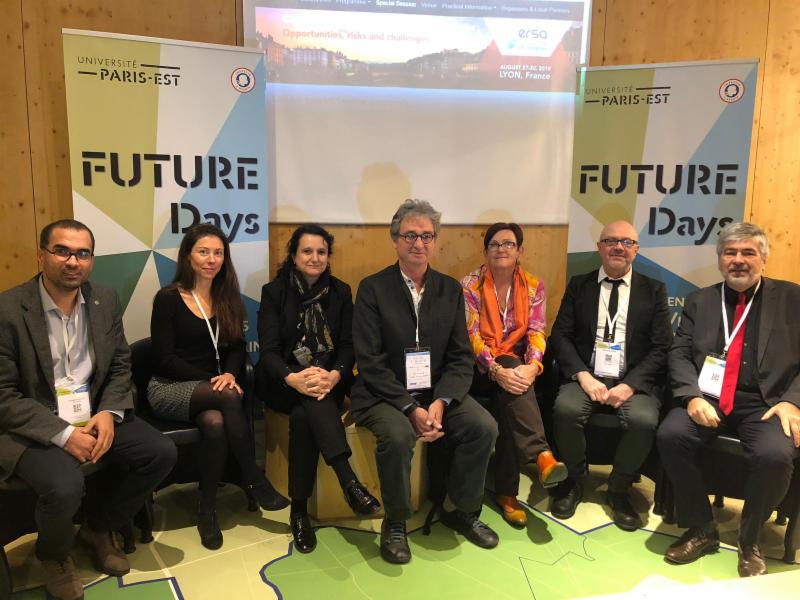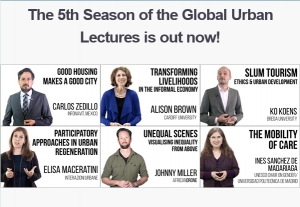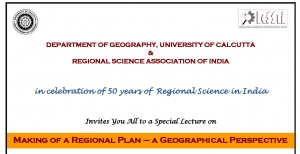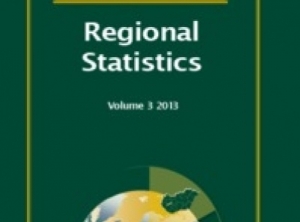RSPP Special Issue Award
Elisabete Martins
ERSA2019 Call for special session proposals, Recent activities, More on ERSA agenda 2019
|
|
|
|
|
|
|
|
|
|
|
|
|
|
|
|
|
|
|
|
13th International Conference: “Challenges of Europe: Growth, Competitiveness, Innovation and Well-being”, 22-24, May 2019, Bol, island Brač, Croatia
keynote speakers will be: Eric Maskin (Nobel laureate, 2007), Oliver Hart (Nobel laureate, 2016), Olivier Blanchard (Peterson Institute for International Economics), Edward Glaeser (Harvard University), Koen Pauwels (Northeastern University), Debora Revoltella (EIB's Chief Economist) and Sergei Guriev (EBRD’s Chief Economist).
More details you may find at: https://conference.efst.hr/
The 5th Season of the Global Urban Lectures is out now!
|
|||||
|
|||||
|
|||||
|
REGIONAL SCIENCE ASSOCIATION OF INDIA in celebration of 50 years of Regional Science in India Invites You All to a Special Lecture
2nd Intensive Course Program, Urban and Regional, Transportation, and Environmental Economics, Depok–West Java, Indonesia, 14 January–8 February, 2019
2nd Intensive Course Program
Urban and Regional, Transportation, and Environmental Economics
Depok – West Java, Indonesia, 14 January – 8 February, 2019
Visit https://spatialeconomics.nl/id/kursus-intensif/ to learn more about the intensive course program.
Our Intensive Course is a fantastic opportunity to learn about transportation economics, environmentalOur Intensive Course is a fantastic opportunity to learn about transportation economics, environmentaleconomics, as well as urban and regional economics. This course is one part of long-term collaborationagreement between School of Business and Economics, VU Amsterdam (SBE-VU) and Faculty ofEconomics and Business, Universitas Indonesia (FEB-UI). The course will help the adjustment processfor prospective students who have the potential to continue master's (S2) and doctoral (S3) programmesat SBE-VU and FEB-UI.
HOW TO APPLY
Please submit your application by email to:This email address is being protected from spambots. You need JavaScript enabled to view it. ; This email address is being protected from spambots. You need JavaScript enabled to view it.
Curriculum Vitae (max. 2 pages)
Motivation Letter (max 2 pages)
Copy of Academic Transcript (optional)
Copy of TOEFL-ITP/IELTS certificate (optional)
IMPORTANT DATES
Registration Deadline :21 December 2018
Announcement of Participant :24 December 2018
Payment Deadline :28 December 2018
Call for papers | XXII Applied Economics Meeting, Universidad Politécnica de Cartagena on June 6-7, 2019
Dear Colleagues,
The next Applied Economics Meeting will take place in Cartagena the 6th and 7th of June, 2019. Enclosed you will find additional information.
We hope we can rely on your usual interest. Let me remind you that the complete paper should be submitted before 1st March, 2019, by using the Conference Maker:
https://editorialexpress.com/cgi-bin/conference/conference.cgi?action=login&db_name=ENCUENTOXXII
Kind Regards,
Mariam Camarero Manuel Ruiz Marín and Andrés Artal
Head of the Scientific Committee Heads of the Local Committee
Call for Paper | 14th International Conference on ECONOMICS, BUSINESS AND SOCIAL SCIENCES, 27-28 February 2019
Dear Sir\Madam,
Sub: Call for Paper’s
I hope and wish that this mail will find you in best of the health and spirit. We would like to inform you that we are organizing an ‘14th International Conference on ECONOMICS, BUSINESS AND SOCIAL SCIENCES, 27-28 February 2019; VENUE The Jayakarta Resort, Bali, Indonesia ‘. I shall be very grateful to you if you participate in this conference. I am enclosing the call for paper for the same with this mail.
All Accepted Papers will published Scopus Index Journals.
Scopus (Elsevier)
Communications on Stochastic Analysis - ISSN 0973-9599 (Scopus Index Journal)
Special Note for Participants: All articles will get published in our journals and journal copies will be handover at the time of conference.
Deadline for Submission of Full Papers: 31th January 2019.
All Correspondence to Submission e-mail: This email address is being protected from spambots. You need JavaScript enabled to view it.orThis email address is being protected from spambots. You need JavaScript enabled to view it.
Kindly forward the same to your friends, colleagues and ask them to join the conference. We need your help for making this Conference Successful.
Thanks and looking for your kind reply,
Yours sincerely
for Academic Research Foundations (India)
Vijay Jha
Conference Organizer: ICEBSS-2019
Academic Research Foundations (India)
4383/4A, Ansari Road, Darya Ganj,
New Delhi-110002 (India)
e-mail: This email address is being protected from spambots. You need JavaScript enabled to view it.
website: www.arfc.co.in
Ph.: 011-23259212 (M) 08826561892
NECTAR cluster meeting on ACCESSIBILITY in Gran Canaria
Dear friends:
I apologize for this short-term notice. I was informed that the NECTAR cluster group on Accessibility is organizing a workshop on December 14-15, 2018, on the beautiful island of Gran Canaria. The general theme is focussed on spatial accessibility. More info can be found on the website: http://www.nectar-eu.eu/ The local organizer is Juan Carlos Martin (This email address is being protected from spambots. You need JavaScript enabled to view it.). If you wish to attend and present a paper, then contact Juan Carlos. NECTAR members - up to a certain number of participants - will normally get free accommodation. We plan to do a special session jointly with The Regional Science Academy (TRSA). You can also contact Karima Kourtit. Hopefully, some - if not all - of you are able to attend.
Best personal wishes,
Peter Nijkamp
Junior Housing Economist /Policy Analyst – Young Professionals Programme (YPP) 2019-21(Job Number: 12470)
Application Closing Date: 09-12-2018, 11:59:00 PM
Housing affordability is currently one of the most complex policy challenges across OECD countries. The unrelenting rise in house prices and rents in many cities is pushing people and families out of their homes, threatening to break cities apart and undermine the chances of children to enjoy better life outcomes than their parents. No magic bullet can solve this problem, which requires all hands on deck: urgent action is needed in all policy areas, ranging from financial market regulation to social housing and local planning policies. In response to the magnitude of the challenge and its multi-dimensional nature, the OECD is developing an innovative large-scale project on housing affordability that will draw on the expertise of different parts of the organisation, including the Centre for Entrepreneurship, SMEs, Regions and Cities (CFE).
CFE is looking for a dynamic and motivated Junior Housing Economist/Policy Analyst, who will work on housing affordability in the context of urban policy.
- )he will work closely with policy makers at local, regional and national levels to develop concrete recommendations on how to improve housing affordability in cities. Furthermore, (s)he will conduct empirical analysis on the determinants of house prices and rents, in particular concerning the effects of local planning policies. The successful candidate will travel frequently to meet and discuss with policy makers and experts from all over the world, and will quickly acquire more responsibilities.
Main Responsibilities
Policy Research and Analysis
- Collect data and construct indicators on housing and planning regulations at the local level. Conduct econometric analysis using the collected data as well as a wide range of other data sources to identify the effects of public policies on housing supply and housing prices
- Conduct research and analysis on housing affordability in cities, by mapping and assessing the content and outcomes of various policies/programmes/projects carried out by different levels of government to improve housing affordability in cities. Take into account housing policies and other policies (e.g. taxation, economic development, land use, mobility and transport, climate change and environment, digitalisation, public service delivery, urban and metropolitan governance and finance, etc.)
- Contribute to developing policy recommendations for policymakers on effective and innovative solutions to improve housing affordability in cities
- Draft review chapters and papers deriving from expert discussions, workshop proceedings, mission reports, webpages, briefings and background materials, PowerPoint presentations, etc. on housing affordability in cities
- Keep abreast of analytical and political developments relating to housing challenges and solutions in cities across OECD countries and beyond.
Liaison and Representation
- Organise field trips and events on housing affordability in cities, by preparing agendas and background documents, liaising with city governments and national governments, selecting people to interview and speakers, providing logistics support, etc.
- Engage with officials in charge of housing policy in cities and national administrations, other international organisations, member country delegations, relevant networks, academia as well as key stakeholder organisations in housing policy (including the private sector, the financial sector, property developers, architects, etc.)
- Promote the work of CFE on housing affordability in international and national events as necessary
- Contribute to horizontal collaboration on housing policy within the OECD. Comment on the work of the latter when required.
Other Tasks
- Support the activities of the Cities, Urban Policies and Sustainable Development Division and the Economic Analysis, Statistics and Multi-level Governance Section as required.
Ideal Candidate Profile
Academic Background
- Advanced university degree in housing/real estate/land/environmental economics, urban economics/policy/planning, or other relevant discipline.
Professional Background
- Proven experience in using advanced econometric methods as well as an excellent understanding of the qualitative dimensions of policies are essential for this position
- Professional experience in research and analytical activities in a policy-oriented context would be an advantage.
Tools
- Very good knowledge of MS Office (Word, Excel and PowerPoint) and statistical software packages (e.g. Stata, R)
- Knowledge of Geographical Information Systems (GIS) and related applications would be an advantage.
Languages
- An excellent written and oral command of one of the two official languages of the OECD (English and French) and good working knowledge of the other. An excellent command of both languages would be an asset.
Core Competencies
For this role, the following competencies would be particularly important: Achievement focus, Analytical thinking, Diplomatic sensitivity, Drafting skills, Flexible Thinking, Strategic Networking, Strategic thinking, Teamwork.
Please refer to the level 3 indicators of the OECD Core Competencies.
Contract Duration
Two-year fixed term appointment, with the possibility of renewal.
Starting Date: September 2019
What the OECD Offers
- Depending on level of experience, monthly base salary starts at 4,561 EUR, exempt of French income tax, plus allowances based on eligibility.
The OECD is an equal opportunity employer and welcomes the applications of all qualified candidates who are nationals of OECD member countries, irrespective of their racial or ethnic origin, opinions or beliefs, gender, sexual orientation, health or disabilities.
The New Issue of Regional Statistics is already Available!
We are pleased to inform you that a new issue of the Regional Statistics has been released and now it’s avaiable online.
http://www.ksh.hu/docs/hun/xftp/terstat/2018/eterstat1801.pdf
REGIONAL STATISTICS, 2018, VOL 8, No 1.
STUDIES
Birgit Glorius: Migration to Germany: Structures, processes, and discourses
http://www.ksh.hu/docs/hun/xftp/terstat/2018/rs080101.pdf
Marcell Farkas – Zoltán Dövényi: Migration to Europe and its demographic background
http://www.ksh.hu/docs/hun/xftp/terstat/2018/rs080103.pdf
Zoltan Egri – Tamas Tanczos: The spatial peculiarities of economic and social convergence in Central and Eastern Europe
http://www.ksh.hu/docs/hun/xftp/terstat/2018/rs080108.pdf
Lívia Berkecz-Kovács: New trends in the development of Hungarian clusters: The case of the Southern Great Plain region
http://www.ksh.hu/docs/hun/xftp/terstat/2018/rs080109.pdf
Levente B. Alpek – Róbert Tésits – Gábor Hoványi: Spatial inequalities of disadvantage accumulation and their impact on
employability in Hungary
http://www.ksh.hu/docs/hun/xftp/terstat/2018/rs080104.pdf
József Benedek – Ibolya Török – Csongor Máthé: Evidence-based designation of development regions in Romania
http://www.ksh.hu/docs/hun/xftp/terstat/2018/rs080105.pdf
György Kocziszky – József Benedek – Dóra Szendi: The impact of the 2008 financial crisis on household income and wealth in Visegrad countries
http://www.ksh.hu/docs/hun/xftp/terstat/2018/rs080102.pdf
Magdolna Komolafe: Dwelling services, with an emphasis on imputed rent in the European Union
http://www.ksh.hu/docs/hun/xftp/terstat/2018/rs080107.pdf
Onur Sungur – Yağmur Zararci: Ranking of provinces by entrepreneurship, innovativeness, and human
capital indicators, using the PROMETHEE method – The case study of Turkey
http://www.ksh.hu/docs/hun/xftp/terstat/2018/rs080106.pdf
Katalin Lipták – Noémi Hajdú: Jarred baby food purchasing habits among mothers of infants in Hungary,
and the features of baby food labels
http://www.ksh.hu/docs/hun/xftp/terstat/2018/rs080110.pdf
Join us to our social networking sites:
About Us
The Regional Science Association International (RSAI), founded in 1954, is an international community of scholars interested in the regional impacts of national or global processes of economic and social change.




 It's only two weeks left before the Call for Special Session proposal is closed.
It's only two weeks left before the Call for Special Session proposal is closed.


 The Romanian Journal of Regional Science has a new website address:
The Romanian Journal of Regional Science has a new website address: 



















